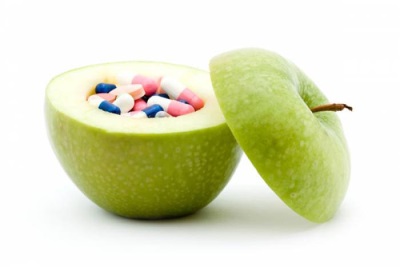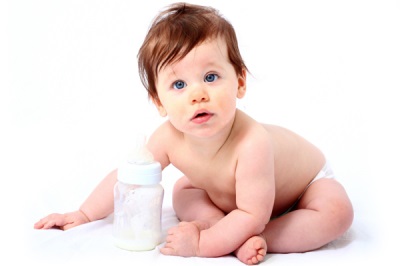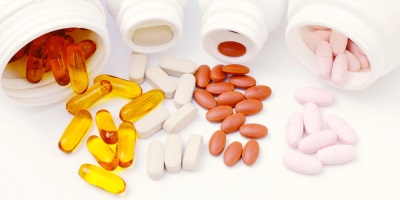Which prebiotics are best for baby?
In case of digestive disorders and problems with intestinal microflora, the child is prescribed various medications, some of which are prebiotics. How do they act on the children's body, why are they used and what are they?
What is it?
The word “prebiotics” refers to various substances that, when released into the large intestine, create conditions that are favorable for normal intestinal microflora. They are not digested in the upper GI tract. Such substances are contained in many foods, as well as are produced by the pharmaceutical industry in the form of drugs (in drops, tablets and other forms).

Prebiotic substances include:
- Inulin;
- Lactulose;
- Cellulose (dietary fiber);
- Pectin and dextrin;
- Lactitol;
- PABK;
- Calcium Pantothenate;
- Galacto-oligosaccharides;
- Chitosan;
- Glutathione, carotenoids, selenium, ubiquinone;
- Sorbitol and Xylitol;
- Raffinose and other substances.
You can find out more about prebiotics in the following video.
Indications for use
The main indication for the use of prebiotics is intestinal dysbiosis. Such substances are prescribed for constipation, diarrhea, bloating, chronic intestinal diseases, food poisoning, as well as after antibiotic therapy.

In addition, prebiotic substances are recommended to be taken when:
- Hepatic encephalopathy;
- Bowel cancer;
- Hemorrhoids;
- Acute infections;
- Fatty degeneration of the liver.
They are also prescribed as a prophylactic measure to prevent constipation and systemic infections.
Contraindications
- Hypersensitivity.
- Intestinal obstruction.
- Galactosemia.
- Suspicion of appendicitis.
- The presence of blood in the feces.
Prescription of prebiotic drugs for diabetes mellitus should be carried out very carefully.
Possible side effects
As a result of prebiotics, the osmotic effect in the liver may appear. Also, there are violations of the enzymes in the large intestine.
Colic, diarrhea, and flatulence are side effects of some drugs with a prebiotic effect, but these symptoms disappear after dose adjustment. Allergic reactions are rarely possible.
Difference from probiotics
WITH probiotics substances with a prebiotic effect are related only by a similar name and a similar effect, since both groups of such drugs normalize microflora in the intestine. For this they are often prescribed in the complex. The main difference is that probiotics are live bacteria, representatives of the intestinal microflora, and prebiotics are chemical compounds that improve their growth and reproduction.
Compared with probiotics, substances with a prebiotic effect immediately affect all groups of bacteria in the intestinal flora.In addition, such substances are not destroyed in the stomach, but reach the bacteria in the intestine in the accepted quantity, while probiotics are partially destroyed in the environment of the stomach.
On the role of prebiotics and probiotics in the life of a child, see the video of the Union of Pediatricians of Russia.
Prebiotic Requirements
To call a substance a prebiotic, it must have such properties and features:
- It should not be broken down and absorbed in the human stomach and small intestine.
- It should be used in the vital activity of beneficial microbes in the intestine, affecting their metabolic activity, as well as growth.
- It should cause a local as well as systemic response of the body, which will result in the normalization of the composition of microflora in the intestine.
Classification
Depending on the structure, prebiotics can be divided into:
- Oligosaccharides - these include carbohydrates, consisting of a small number of molecules. These are lactose, fructosaccharides, lactulose, galacto-oligosaccharides.
- Polysaccharides are represented by carbohydrates with a large number of molecules. These are food fibers, inulin.
Pure prebiotics are also isolated, which are preparations that contain only prebiotic substances. There are combinations of prebiotics and enterosorbents, as well as prebiotics and probiotics.

Does immunity increase?
Prebiotic substances affect local immunity in the intestines, so their use affects the immunity of the organism as a whole. That is why they are recommended to take with infectious diseases and deterioration of the immune system.
Principle of action on the body
Prebiotics have this effect:
- Increase the number of bacteria belonging to the normal intestinal microbial flora, while simultaneously reducing the number of microbes that are considered conditionally pathogenic flora.
- The reproduction of pathogenic microorganisms, for example, Shigella, Salmonella, Listeria and others, is inhibited.
- They help remove excess mucus from the colon, as well as promote faster healing of damage to the intestinal walls (accelerate epithelialization).
- Maintain acidity in the intestines, which is optimal for bacteria representing normal flora.
- Enhance peristalsis and make fecal mass more voluminous, thereby helping to eliminate constipation.
- Remove gases from the intestines and reduce their formation.
- Helps bacteria synthesize vitamins in the intestines.
- Stimulate local immunity.
- Increase calcium absorbability from food by 40-60%.
- They protect the mucous membrane of the colon from damage by free radicals.

For newborns
One of the important and common prebiotics is milk sugar, which is present in breast milk. It is due to the presence of lactose in the mother's milk, the digestive organs of the infant develop normally, being populated with beneficial flora. Therefore, breastfeeding is an important condition for the normalization of digestive processes in the intestines of a child. If for any reason it is not possible, the infant formula is prescribed a milk formula containing both lactose and other prebiotics.
For older children
Useful microorganisms in the children's intestines predominantly consume carbohydrates, which are not absorbed in our bodies, and the pathological flora often feeds on protein, so there must be enough carbohydrate foods containing prebiotic substances in the diet of an older child.Their entry into the intestines will cause the active growth of beneficial bacteria, which will inhibit opportunistic and harmful flora.
Use after antibiotics
Antibiotics prescribed for an infectious disease do not have a specific effect; therefore, they simultaneously inhibit both the infectious agent and the beneficial microflora. That is why antibiotic therapy is often the cause of dysbiosis, and prebiotics help in the resumption of the balance of microorganisms in the intestine. All prebiotics can be taken for a long time until the moment when the unpleasant symptoms disappear and the state returns to normal.
Prebiotics in products
Most of the bacteria that live normally in the intestines of a child use carbohydrates and amino acids for life, so their numbers depend on a sufficient supply of nutrients to the intestines.
Foods contain natural prebiotics in the form of oligo- and polysaccharides, fiber, amino acids and other compounds:
- Dairy products include prebiotic lactose, important for the reproduction of lactic and bifidobacteria in the digestive tract of a child. The first lactose enters the intestines of the baby with breast milk or formula. The benefits of dairy products are increasing due to the fact that they also supply live bacteria to the children's organism that form the intestinal flora.
- Raw fruits and vegetables are rich in fructosaccharides. They are practically not processed by the intestines of a child, but serve as food for beneficial bacteria.
- Root crops contain a lot of inulin polysaccharide. This compound is not just a food for microorganisms in the intestines, but also reduces cholesterol levels, and also improves calcium absorption.
- Vegetables, cereals and fruits are very rich in cellulose, related to dietary fiber. It is not processed at all in the intestines of children, but it is important for the reproduction of beneficial microbes and helps to remove harmful substances from the digestive tract more quickly. Especially rich in cellulose bran, carrots, beans, currants, oatmeal, oranges, prunes, radishes, dill and other products.

The names of pharmaceutical drugs and their review
Consider in the table a list of the main prebiotic drugs.
Drug name | Release form | Active substance | Age of application | Special features |
Syrup in vials, sachets | Lactulose | From birth, but under medical supervision | Often prescribed for a laxative effect. | |
Hilak Forte | Drops in vials | Substances secreted by normal microflora in the process of vital activity | From 2 years | The drug must be diluted in water. It is not recommended to be taken together with dairy products. |
Lactulose | Powder | Lactulose | Since birth | You should not take it within 2 hours after taking any other medicine. |
Good luck | Syrup in the vial | Lactulose | Since birth | |
Pills | Lignin supplemented with lactulose | From 1 year | May reduce the effects of medication taken with this drug. | |
Portalak | Syrup in the vial | Lactulose | Since birth | |
Eubicore | Powder Bag | Dietary fiber obtained from wheat and supplemented with inactivated sugar cubicles | 12 years old | |
Prelaks Baby | Bottles with liquid, bags of powder | Lactulose, lactose and galactose | Since birth | Often prescribed as laxative. |
Syrup in the vial | Lactulose | Since birth | ||
Powder bags | Lactitol | From 1 year | Can be used for diabetes. It is important to increase the amount of fluid consumed. | |
Lactusan | Bottle with syrup tablets | Lactulose, fructose and galactose | Syrup since birth. Tablets - for children over 5 years. | |
Livolyuk PB | Syrup in the vial | Lactulose | Since birth | |
Stimbifeed | Pills | Inulin, oligofructose, vitamin complex, selenium and zinc | From 6 months | Small children tablets are crushed, they can be added to porridge or dairy product. |
Importal N | Powder Bag | Lactitol | From 1 year | Does not affect blood glucose. |
Romfalak | Syrup in the vial | Lactulose | Since birth | |
Normospectrum Baby | Powder Capsules | Inulin, oligofructose, lacto-and bifidobacteria, vitamins, minerals | From 18 months | Children under 3 years old open the capsules and dissolve their contents in 10 ml of water. Can not be taken with hot food. |
Which is better to choose?
If you choose a prebiotic with a prophylactic purpose, or the changes in the microflora in the baby’s intestine are not too pronounced, you should focus on correcting the baby’s diet. Include in the kid's menu a sufficient amount of products containing natural prebiotics, in particular, cereals, fruits, dairy and dairy products, vegetables.

If you do not have the opportunity to enrich the diet of the baby with food with prebiotics or violations of the microflora are very pronounced, you should use pharmacy drugs with prebiotic substances. They are indicated for severe dysbacteriosis and complications of diseases of the digestive tract.
For more information about prebiotics and food products in which they are contained, see the program "To Live Healthy".













